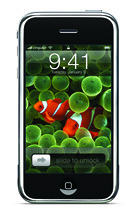If you missed it, Rick suggested the real question will be whether the term iPhone will be considered a trademark or generic term for a type of telephone.
“This question ultimately turns on the understandings of the relevant consumer market,” he wrote, “So I expect Apple and Cisco to introduce consumer surveys in addition to evidence from dictionary and media sources and references to the status of other ‘i-noun’ terms.”
If that is the case, it seems to me that Apple’s apparent dominance over “i” anything may carry the day, because the public seems to want the Apple phone to be an iPhone. Likewise, there seems to be public resistance to the Cisco iPhone, even after it was explained that it owned the trademark. Of course, that is a communication observation; a judge could just as easily rule against Apple and that would be that, er, until the appeal.
On the communication front, we ask, to what end? Sometimes you can win a lawsuit but lose consumer appeal.
In attempting to address “what is,” it seems to me that Cisco has two battles on its hands. It wants to win the lawsuit because it acquired the iPhone trademark in 2000 after completing the acquisition of Infogear, which previously owned the mark since 1996. But, I suspect, it also wants to win over public perception that this is the right thing to do.
"Cisco entered into negotiations with Apple in good faith after Apple repeatedly asked permission to use Cisco's iPhone name," said Mark Chandler, senior vice president and general counsel, Cisco. "There is no doubt that Apple's new phone is very exciting, but they should not be using our trademark without our permission.”
Outside the courtroom, it becomes tricky. First, Ed Bernette at ZD Net wrote an interesting article on the case, noting that Cisco may not own the mark as claimed. Second, in order to sway public opinion on this issue, someone is going to ask under what terms was Cisco willing to grant Apple permission to use the name iPhone. And third, if it was in negotiations over the name, why did Cisco suddenly make a push on a complete line of iPhone products?
According to the aforementioned article, it had to push iPhone products: “If Cisco didn't launch a product using the iPhone name, their trademark registration would be canceled and they would have no bargaining chips with Apple. So in order to keep the trademark active, they had to file the Declaration of Use, and start selling a product under that trademark.”
Add to all this a recent blog post from Chandler: “Was it money? No. Was it a royalty on every Apple phone? No. Was it an exchange for Cisco products or services? No.”
While the post shows how seriously Cisco takes public perception, it also focuses more attention on that other unanswered question: what were the terms that prompted Apple to abandon negotiations and launch an “iPhone” without an agreement? Or was it something else, an eureka moment from Apple’s legal team perhaps, that killed the deal?
At the moment, only a few know. What the public knows is that several people have laid claim to iPhone over the years, including a Toronto-based company that has been marketing voice-over-Internet services under the registered trademark iPhone since 2004 and even has a wireless device called iPhone Mobile.
How a 2004 claim could potentially supersede Cisco’s claim, I am not sure (unless the ZD Net article is right). However, based upon the comment contribution referenced earlier, it could potentially assist Apple if Apple is looking to turn the trademark iPhone into a generic term, which it may or may not do.
What we also know is that Apple and Cisco have appealed their cases to the public; Apple by releasing its product as an iPhone and Cisco by publicly stating it expected Apple was onboard with those mysterious terms. How good a case both sides can make to the public will be decided by the public or perhaps by investors, who never like to hear the term lawsuit associated with their investments, especially when risks seem to outweigh the advantages.
Sure, Cisco is right to challenge Apple over a trademark it considers an asset. Apple is also well within its rights to look for some wiggle room on a name that has been associated with its product concept before it even landed on the drawing board. But given that the courtroom is not the only place both companies have made a case, public perception may weigh in more heavily than the letter of the law. That’s not good, bad, or indifferent — that is "what is."
All the while, both companies have to be careful not to damage their respective brands that have far and away more value than the potential brand value of an “iPhone.”



















1 comments:
Famous Last Words:
"We have met all elements required by all authorities to maintain our mark. We've been pretty direct about the fact that we've been shipping the iPhone since last spring." — John Earnhardt on a special post entitled "Cisco to Blogosphere: We're Listening"
Post a Comment